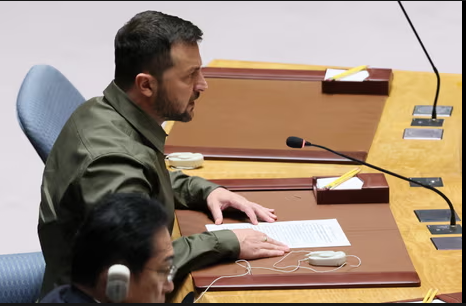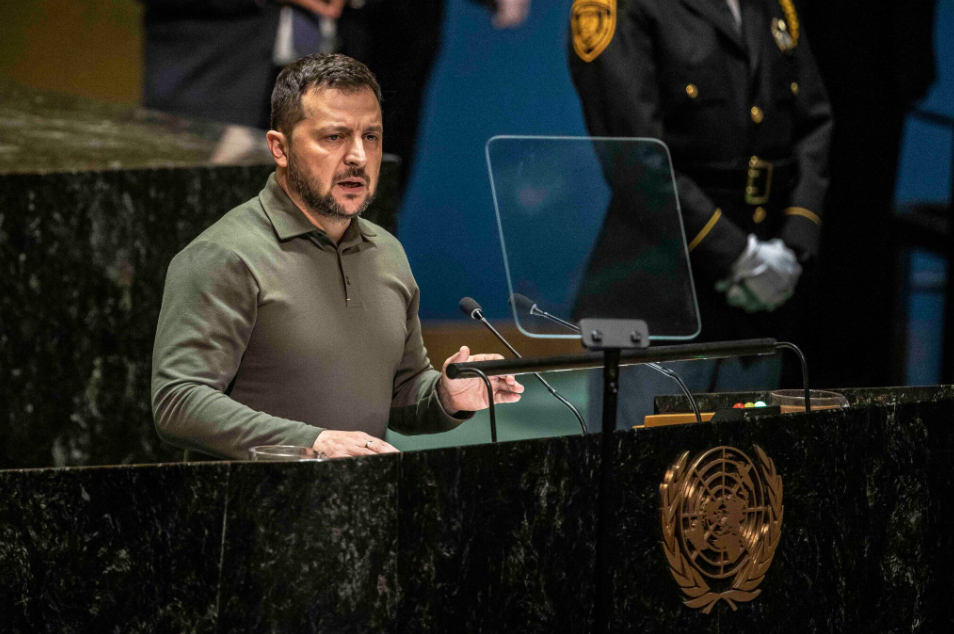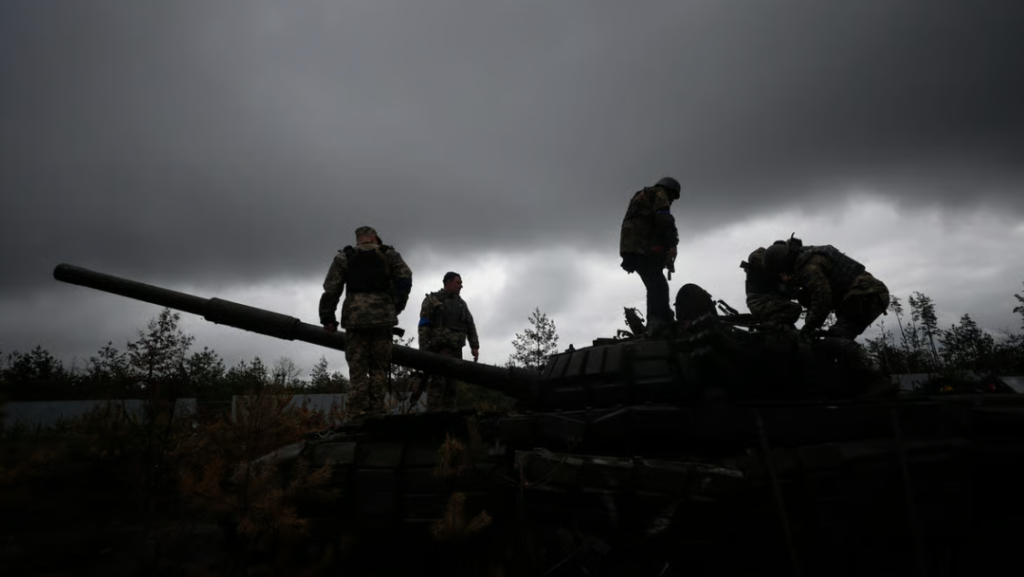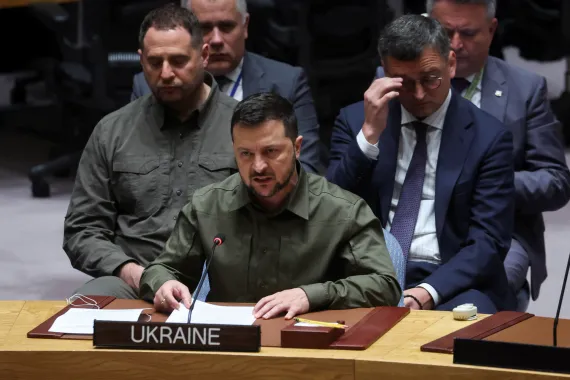The ongoing conflict between Russia-Ukraine has drawn international attention and concern since its inception. Ukrainian President Volodymyr Zelenskiy recently expressed his frustrations with the United Nations’ response to the situation, citing its ineffectiveness in defending Ukraine’s borders. This article provides an overview of President Zelenskiy’s remarks and the broader implications of the conflict for international diplomacy.
Zelenskiy’s Critique of the UN
In a candid address to the United Nations, President Zelenskiy voiced his disappointment with the international community’s response to Russia’s aggression in Ukraine. He argued that the UN had not lived up to its mandate of safeguarding the sovereignty and territorial integrity of member states. Zelenskiy’s plea was for the UN to take a more proactive role in protecting Ukraine’s borders from further encroachment.

The Ongoing Conflict:Russia-Ukraine
The conflict between Russia and Ukraine, which began in 2014 with Russia’s annexation of Crimea, has persisted for nearly a decade. Despite numerous attempts at ceasefires and diplomatic negotiations, sporadic fighting continues in Eastern Ukraine, particularly in the Donbas region. This prolonged conflict has resulted in significant loss of life, displacement of civilians, and economic strain on both countries.
International Response:
The international community, including the United Nations, has not been passive in response to the Russia-Ukraine conflict. Sanctions have been imposed on Russia, diplomatic talks have been held, and efforts to broker ceasefires have been ongoing. However, as President Zelenskiy’s recent remarks highlight, the effectiveness of these measures in halting the conflict and protecting Ukraine’s territorial integrity has been limited.

Challenges in Diplomacy:
The Russia-Ukraine conflict poses several challenges to international diplomacy:
- Geopolitical Interests: The involvement of major world powers, including Russia and NATO member states, complicates diplomatic efforts. Competing geopolitical interests often hinder the resolution of the conflict.
- Proxy Warfare: The conflict has seen the use of proxy forces, making it difficult to establish clear lines of responsibility and negotiate with all parties involved.
- Humanitarian Crisis: The conflict has caused a significant humanitarian crisis, with millions of people in need of aid. Addressing the immediate needs of affected populations is a top priority alongside diplomatic efforts.
The Way Forward:
President Zelenskiy’s call for the UN to do more to defend Ukraine’s borders underscores the urgency of finding a diplomatic solution to the conflict. The international community must redouble its efforts to bring all parties to the negotiating table and work towards a lasting ceasefire and resolution.
- Diplomatic Engagement: Continued diplomatic efforts, involving all relevant stakeholders, are crucial. A comprehensive peace agreement that addresses the root causes of the conflict and guarantees Ukraine’s sovereignty is needed.
- Humanitarian Aid: Addressing the humanitarian crisis in Ukraine must remain a priority. Aid organizations and countries should continue to provide assistance to those affected by the conflict.
- Sanctions and Accountability: The international community should maintain and, if necessary, escalate sanctions on Russia until a peaceful resolution is achieved. Accountability for war crimes and human rights violations must also be pursued.

International Solidarity:
President Zelenskiy’s appeal to the United Nations also serves as a call for greater international solidarity. The Russia-Ukraine conflict is not limited to the immediate region; it has broader implications for global security and the principles of sovereignty and territorial integrity. An effective response from the international community is essential not only to address this specific conflict but also to uphold these fundamental principles.
The Role of Diplomacy in Conflict Resolution:
Diplomacy remains the most viable path to resolving the Russia-Ukraine conflict. It requires tireless efforts from mediators and negotiators to bridge the divides between the parties involved. The United Nations, alongside other international bodies and individual nations, must continue to facilitate and support diplomatic talks aimed at achieving a comprehensive peace settlement.
A Call for Dialogue:
In addition to diplomatic efforts, fostering direct dialogue between Russia and Ukraine is paramount. Communication channels need to remain open to prevent misunderstandings and miscalculations that could escalate the conflict. Confidence-building measures and negotiations must be pursued vigorously.
Civilian Protection
As diplomatic efforts persist, the protection of civilians caught in the crossfire is of utmost importance. Both Russia and Ukraine, along with the international community, should prioritize the safety and well-being of civilians in conflict-affected areas. This includes ensuring access to humanitarian aid, safe evacuation routes, and respect for international humanitarian law.
A Test for International Institutions:
The Russia-Ukraine conflict serves as a test for international institutions like the United Nations. It highlights the need for these organizations to adapt and respond effectively to the evolving challenges of the 21st century. The international community must reflect on the effectiveness of existing mechanisms and be prepared to reform and strengthen them to better address conflicts like this in the future.
The World’s Watchful Eye:
The world is watching as events in Ukraine unfold. The outcome of the conflict will not only affect the immediate parties involved but will also have broader implications for global security and the principles of international law. It is incumbent upon the international community to heed President Zelenskiy’s call, redouble its efforts, and work tirelessly towards a peaceful resolution that respects Ukraine’s sovereignty and territorial integrity.
Conclusion:
The Russia-Ukraine conflict remains a complex and challenging issue on the global stage. President Zelenskiy’s critique of the United Nations’ response underscores the urgency of finding a diplomatic solution. As diplomacy continues to be the primary means of resolving the conflict, the international community must remain committed to facilitating dialogue, protecting civilians, and upholding the principles of international law. The path to peace may be difficult, but it is the only path that can bring lasting stability and security to the region.
ALSO READ :Relationship Tension Between India And Canada: Will It Hinder Trade?




































